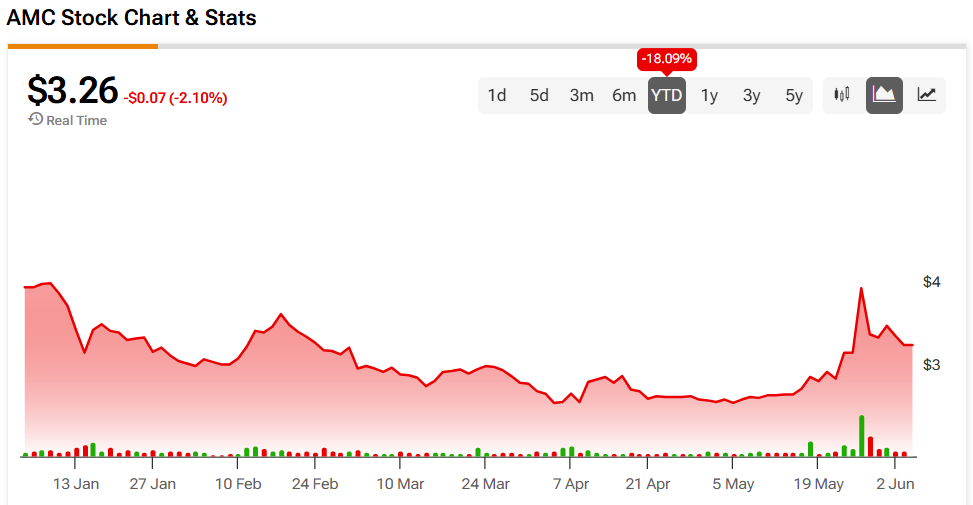AMC Entertainment (AMC) just posted its best Memorial Day weekend ever, setting new records for both ticket sales and concession revenue. But despite packed theaters and positive box office momentum, the stock has dropped more than 16% over the past week. The disconnect highlights a deeper issue: while strong movie turnout is encouraging, it’s not enough to offset the company’s underlying financial challenges. With lingering structural issues, ongoing meme-driven volatility, and more attractive opportunities elsewhere in the sector, I remain bearish on AMC for now.
Confident Investing Starts Here:
- Easily unpack a company's performance with TipRanks' new KPI Data for smart investment decisions
- Receive undervalued, market resilient stocks right to your inbox with TipRanks' Smart Value Newsletter

The Bright Spots
There’s no denying that AMC is enjoying some genuine momentum. The Memorial Day weekend was a clear highlight, as more than 7 million people went to an AMC to catch a movie (or two) over the holiday. This helped the company set new records for admissions, food and beverage sales, and overall revenue.
Furthermore, the industry is experiencing upward trends. After a brutal start to 2025, the spring months brought a welcome turnaround. April’s box office results were double what they were the previous year, suggesting that audiences are returning to theaters (finally).
AMC is looking to ride the wave of returning moviegoers by doubling down on offering “premium experiences”, including upgraded seating, enhanced sound systems, and larger screens. These premium formats command higher ticket prices, which should help boost revenue per customer.
Finally, the company has recently announced it is experimenting with new advertising strategies, potentially creating another revenue stream.
Where Does the Red Carpet Lead?
Despite riding a rising tide and operational improvements, AMC’s financial health remains problematic. The first quarter of 2025 was particularly challenging, with several key metrics heading in the wrong direction.
Revenue dropped by 6.7% year-over-year, falling to $862.5 million. Furthermore, AMC reported a loss of $202.1 million for the quarter, compared to a loss of $163.5 million during the same period in 2024. The impact this has had on AMC’s cash reserves is alarming. Cash levels have dropped dramatically from $632.3 million to just $378.7 million. This rapid cash burn is worrying.

Ultimately, AMC’s debt is a significant burden. The company carries a staggering $8.28 billion in total debt, with $43 million in debt payments due this year, $173 million next year, and a whopping $526 million in 2027. With less than $400 million in cash, its interest coverage ratio is now an anemic -0.18.
Is AMC a Buy, Hold, or Sell?
AMC’s leadership team remains bullish about the company’s prospects. Management is projecting annual revenue growth of about 7% over the next three years. While this sounds encouraging, it’s actually slightly below the average for the broader entertainment industry, suggesting AMC may continue to face headwinds even in a recovery scenario.

Analysts following the company hold a mixed outlook for its prospects, rating it a Hold overall, with a 12-month price target of $2.92. Most recently, Texas Capital’s Eric Wold rated AMC a Hold, with a price target of $3. Noting AMC’s significant debt and upcoming maturities, he suggests cash flow challenges from rising interest expenses could impact the company’s equity valuation.
Meanwhile, B. Riley’s Drew Crum has lowered the price target on AMC to $3, while maintaining a Neutral stance. He maintains a generally positive outlook for the industry, given a robust upcoming slate of Hollywood films that are expected to drive box office recovery.
Citi analyst Jason Bazinet holds a more pessimistic view, recently reiterating a Sell rating. However, he slightly increased the price target to $2.60, citing changes in advertising forecasts amid reduced tariff concerns.
The Meme Stock Wild Card
Any discussion of AMC stock would be incomplete without addressing its “meme stock” dynamics. Take May as an example—the share price nearly doubled within a matter of days, fueled by a wave of coordinated buying from retail investors on platforms like Reddit.
These kinds of explosive moves have become a defining feature of AMC’s trading behavior. But the rallies are usually fleeting. Once the hype dies down, the stock often gives back its gains as the company’s underlying financial challenges come back into focus—something we’ve likely seen play out over the past week.
While AMC’s meme stock status can create bursts of excitement for short-term traders, it also brings extreme volatility. That volatility distorts traditional valuation metrics and skews technical indicators, such as moving averages, making it difficult to assess the stock through a conventional investment lens.
Final Analysis on AMC
The question for AMC ultimately revolves around whether resurgent demand and operational improvements can overcome its financial constraints. Until AMC can demonstrate consistent profitability and make meaningful progress in reducing its debt burden, positive box office trends will not be enough to sustain the stock (though ongoing meme-related volatility spikes are likely).
I am inclined to avoid AMC until the company can demonstrate that it can turn its box office momentum into the kind of sustained financial performance that will help it climb out of its debt crater.
Looking for a trading platform? Check out TipRanks' Best Online Brokers , and find the ideal broker for your trades.
Report an Issue
















